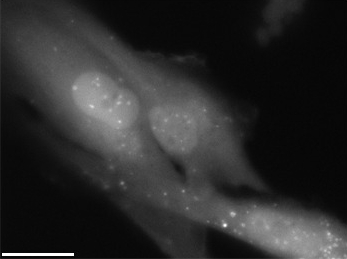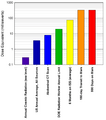Acute radiation syndrome facts for kids
Quick facts for kids Acute radiation syndrome |
|
|---|---|
| Synonyms | Radiation poisoning, radiation sickness, radiation toxicity |
 |
|
| Radiation causes cellular degradation by autophagy. | |
| Symptoms | Early: Nausea, vomiting, loss of appetite Later: Infections, bleeding, dehydration, confusion |
| Usual onset | Within days |
| Types | Bone marrow syndrome, gastrointestinal syndrome, neurovascular syndrome |
| Causes | Large amounts of ionizing radiation over a short period of time |
| Diagnostic method | Based on history of exposure and symptoms |
| Treatment | Supportive care (blood transfusions, antibiotics, colony stimulating factors, stem cell transplant) |
| Prognosis | Depends on the exposure dose |
| Frequency | Rare |
Acute radiation syndrome (ARS), also known as radiation sickness or radiation poisoning, is a collection of health effects due to exposure to high amounts of ionizing radiation over a short period of time.
Within the first days symptoms may include nausea, vomiting, and loss of appetite. This may then be followed by a few hours or weeks with little symptoms. After this, depending on the total dose of radiation, people may develop infections, bleeding, dehydration, and confusion, or there may be a period with few symptoms. This is finally followed by either recovery or death. The symptoms can begin within one hour and may last for several months.
The radiation generally occurs from a source outside the body, is applied over minutes with most of the body being exposed, and involves a total dose of greater than 0.7 Gy (70 rads).
It is generally divided into three types:
- bone marrow syndrome
- gastrointestinal syndrome
- neurovascular syndrome
Sources of such radiation may include nuclear reactors, cyclotrons, and certain devices used in cancer therapy.
The cells that are most affected are generally those that are rapidly dividing. Diagnosis is based on a history of exposure and symptoms. Repeated complete blood counts (CBCs) can indicate the severity of exposure.
Treatment of acute radiation syndrome is generally supportive care. This may include blood transfusions, antibiotics, colony-stimulating factors, or stem cell transplant.
If radioactive material remains on the skin or in the stomach it should be removed. If radioiodine was breathed in or ingested, potassium iodide may be recommended. Complications such as leukemia and other cancers among those who survive are managed as usual. Short term outcomes depend on the exposure dose.
ARS is generally rare. A single event, however, can affect a relatively large number of people. Notable cases occurred following the atomic bombing of Hiroshima and Nagasaki and the Chernobyl nuclear power plant disaster.
ARS differs from chronic radiation syndrome, which occurs following prolonged exposures to relatively low doses of radiation.
Images for kids
-
Comparison of Radiation Doses – includes the amount detected on the trip from Earth to Mars by the RAD on the MSL (2011–2013).
See also
 In Spanish: Síndrome de irradiación aguda para niños
In Spanish: Síndrome de irradiación aguda para niños




